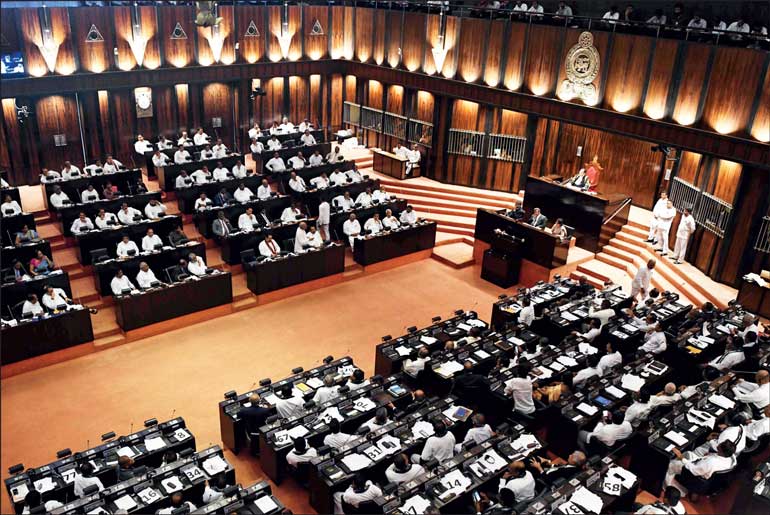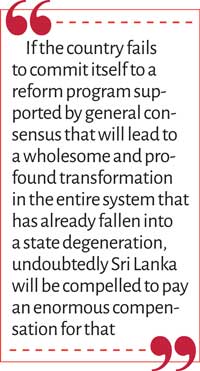Sunday Feb 15, 2026
Sunday Feb 15, 2026
Friday, 28 April 2023 00:15 - - {{hitsCtrl.values.hits}}

If all the parties concerned could work together in Parliament, how could they find it difficult to work together in a
reformation program aimed at rescuing the country that has fallen into a great crisis? – Pic by Shehan Gunasekara
 Undoubtedly, Sri Lanka and its people will be compelled to pay a heavy price unless it introduces necessary reforms expeditiously, to make the socio-political system respectable, modern, corruption-free and orderly, rather than restricting its efforts only to launch economic and financial reforms to solve the balance of payments crisis. Failure to do so might even jeopardise the efforts to solve the balance of payments crisis. Some of the main problems that need to be solved by a reform program in Sri Lanka are as follows.
Undoubtedly, Sri Lanka and its people will be compelled to pay a heavy price unless it introduces necessary reforms expeditiously, to make the socio-political system respectable, modern, corruption-free and orderly, rather than restricting its efforts only to launch economic and financial reforms to solve the balance of payments crisis. Failure to do so might even jeopardise the efforts to solve the balance of payments crisis. Some of the main problems that need to be solved by a reform program in Sri Lanka are as follows.
1. Reforms to be made with the aim of building the nation so as to ensure equal human dignity and equal rights to everyone without discriminations based on caste, ethnicity, religion and gender differences.
2. Reforms to be made with the aim of making the political system respectable, free from corruption, efficient, transparent and democratic and leading to the division of power, of which the following reforms are the main ones.
(a) The head of State (President) who, at the moment, stands above the law should be subordinated to the law.
(b) Restore the judicial review, the authority to review executive action and ensure that the government and administration act in conformity with the law, granted to the judiciary by the Soulbury government system raising the standard of the judiciary, which was later revoked by the 1972 and 1978 Constitutions.
(c) Prohibit the President, Members of Parliament, representatives elected to Local Councils and Local Government bodies and government officials doing business with the government (until 1978, transacting business with the government by public representatives and officers was considered a serious offense punishable by the law; after 1978, the law was not repealed, but not implemented). Policies and laws that make it mandatory to punish those who transact business with the government must be adopted and effectively implemented.
(d) Establish laws and policies that would ensure the practices of internal democracy in political parties, professional organisations and trade unions.
(e) Although there are self-regulatory bodies for some professions and professionals, it is necessary that a similar system shall be created for professions which do not have such a system. Most of the professional bodies have failed to demonstrate good practices in dealing with complaints made against them for breach of professional ethics and commitment of wrongdoings. An institutional system to which the aggrieved parties who have been deprived of justice for their complaints could submit appeals seeking redress must be established. It should have the authority to investigate and punish the culprits who have committed mistakes. The cost of maintaining this institutional system should be borne by the professional organisations themselves.
(f) Investigate the causes of the collapse of the digitised systems installed in government and semi-government institutions at a very heavy cost, and if the systems of digitalisation are found to have been designed deliberately to pave the way for the heads of those institutions to misuse them in corrupt manner, severe action must be initiated against the companies which have supported them after having charged the government heavily for installing them. The government should initiate the use of efficient, modern and tamperproof digital systems which are up to accepted international standards, to enhance tax administration processes for the collection of income tax and other institutions which generate revenue for the government.
(g) As some countries have already adopted, a system can be designed where a large group of voters could come together and submit proposals to the Parliament. Accordingly, when a resolution signed by a certain number of people prescribed by law is presented to the Parliament, the Speaker should include it in the agenda, debate it and put it to a vote. Such a system will not only strengthen the sovereignty of the people, but also make the parliament efficient and people friendly by making it possible for solving many problems that have been stagnating without a solution.
(h) Violation of the Constitution should be made a punishable offense.
(i) A public participatory Constitution could be adopted. If necessary, a reform program of this nature could be implemented in two phases including a general election. This is how it was implemented in South Africa. Thus, the first phase will be implemented by the government in power and other parties representing the main Legislature, while the second phase will be implemented by the new government that will come to power after the election and the other parties representing the main legislature. It can be made an unavoidable and irreversible reform program by adopting an interim Constitution for the entire process. That is what happened in South Africa. No matter how hard the Opposition may struggle, it cannot bring about reforms without the support of the ruling party. Similarly, no matter how militant the people may become, they alone cannot bring about reforms without the support of the Legislature. Sri Lanka is facing a crisis of failure caused by the delay in bringing about necessary reforms to rectify the serious mistakes that have been committed over an extremely long period. If the reforms are delayed even after the outbreak of the crisis, Sri Lanka will undoubtedly have to pay a bigger price for the “opportunistic stupidity” of the politicians.
 Usually in any country a large-scale and major reform program takes place with all-party participation or in a similar form. A reform program initiated collectively with the participation of opposition parties for the common good of the country does not defile or efface the image of any party. If all the parties concerned could work together in Parliament, how could they find it difficult to work together in a reformation program aimed at rescuing the country that has fallen into a great crisis? In a country like Sri Lanka, it is a usual occurrence that the rulers do not like serious reform programs. But, President Ranil Wickremesinghe is a leader who has reiterated his desire to open the doors to a reform program. The number one of my reform proposals was that all political prisoners (including Ranjan Ramanayake) should be released; number two was that the President, who is above the law, should be placed under the law. As far as I know, the President acceded to implement the second proposal; I am at a loss to understand why the other parties refuse to work with the implementation of the reform program initiated by such a person who is ready to forgo the unlimited powers enjoyed by him.
Usually in any country a large-scale and major reform program takes place with all-party participation or in a similar form. A reform program initiated collectively with the participation of opposition parties for the common good of the country does not defile or efface the image of any party. If all the parties concerned could work together in Parliament, how could they find it difficult to work together in a reformation program aimed at rescuing the country that has fallen into a great crisis? In a country like Sri Lanka, it is a usual occurrence that the rulers do not like serious reform programs. But, President Ranil Wickremesinghe is a leader who has reiterated his desire to open the doors to a reform program. The number one of my reform proposals was that all political prisoners (including Ranjan Ramanayake) should be released; number two was that the President, who is above the law, should be placed under the law. As far as I know, the President acceded to implement the second proposal; I am at a loss to understand why the other parties refuse to work with the implementation of the reform program initiated by such a person who is ready to forgo the unlimited powers enjoyed by him.
Apparently, it is the opposition parties, not the ruling party that are opposed to a rapid reform program. The opposition parties seem to think that reforms should be introduced only under a government of their own and not before that. It is doubtful whether they even know exactly when they could come to power. A policy that allows the country to fall into destruction until they come to power cannot lead to the good of the country. I find the popular argument put forward by them that Ranil does not have a public mandate for that is weird and absurd.
According to the Article 40 of the Constitution of Sri Lanka, if the office of President shall become vacant prior to the expiration of his term of office due to the death, resignation, dismissal or relinquishment, Parliament shall elect as President one of its Members who is qualified to be elected to the office of President for the unexpired period of the term of office of the President vacating office. There is no provision that the successor has to be appointed necessarily after a presidential election. The person so appointed has all the powers of a president without any deficiency. Similarly, if such a vacancy occurs in the presidency of the United States, it will be filled not by a new person elected in a presidential election, but by appointing the vice president to the office of presidency.
An agenda or roadmap for a reform program should be prepared through a series of dialogue held between all parties related to the reform program. The new Anti-Terrorism Act (ATA) proposed by the Sri Lankan parliament, designed to replace the existing Prevention of Terrorism Act (PTA) could also be included in such a discussion program. Then it would be possible to be brought to an acceptable standard that will bring honour to the country. Such a reform program could also be considered as a unique opportunity to test for, and the emergence of intelligent young leaders. Such a reform program will help eliminate the chaos in the country and make Sri Lanka a country that works with great expectations and it will also contribute to make the economic performance of the country efficient and faster.
At the same time, if the country is able to solve the problems associated with the differences of caste, ethnicity, religion and gender issues that have been pestering for a long time, that alone will generate a huge driving force for Sri Lanka to rise itself to a greater height. If the country fails to commit itself to a reform program supported by general consensus that will lead to a wholesome and profound transformation in the entire system that has already fallen into a state degeneration, undoubtedly Sri Lanka will be compelled to pay an enormous compensation for that.